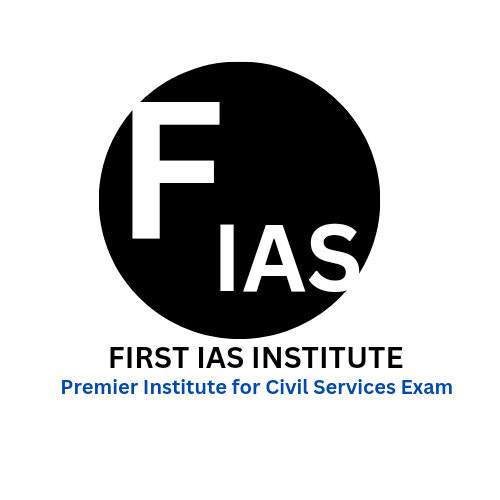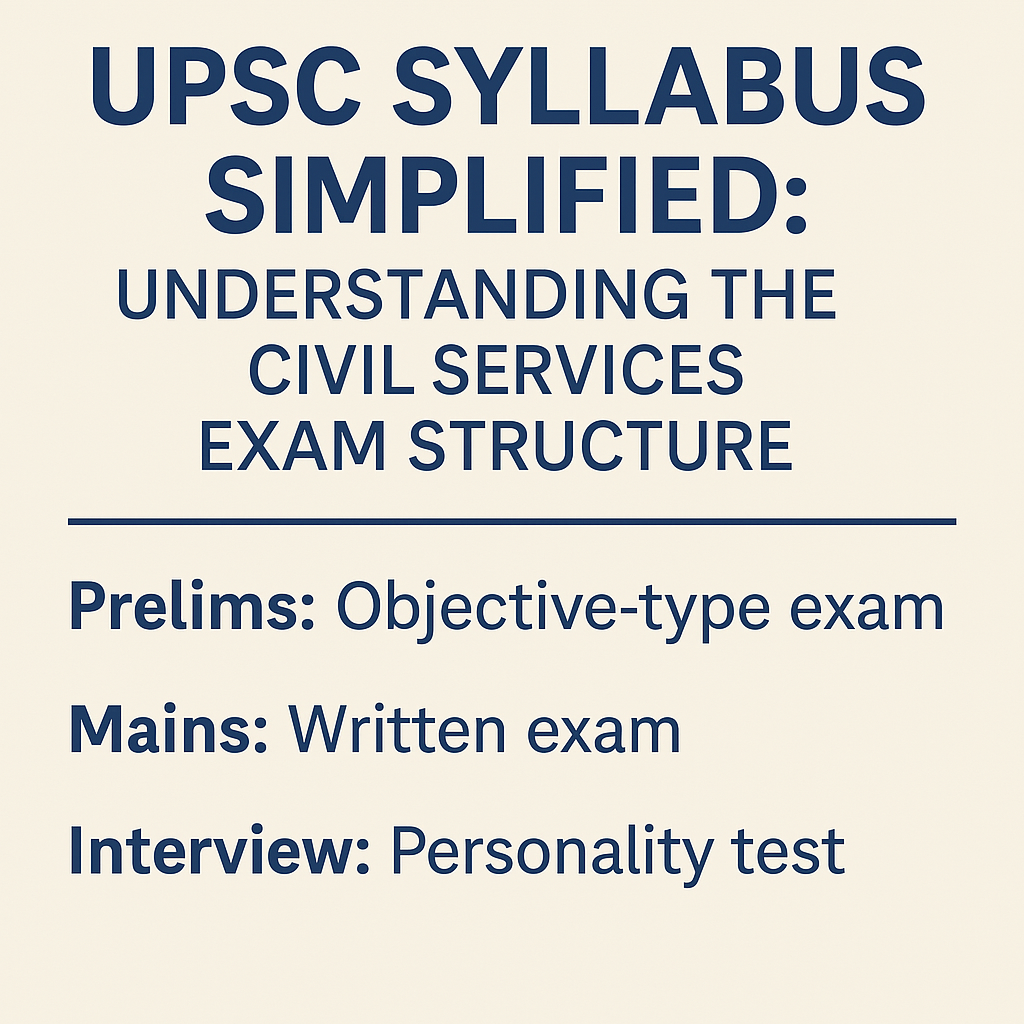UPSC Syllabus Simplified: Understanding the Civil Services Exam Structure
The Civil Services Examination (CSE), conducted by the Union Public Service Commission (UPSC), is considered one of the most prestigious and competitive exams in India. Every year, lakhs of aspirants appear with dreams of joining the Indian Administrative Service (IAS), Indian Police Service (IPS), Indian Foreign Service (IFS), and other Group A and B services.
But to succeed in this journey, the first step is to thoroughly understand the exam structure and syllabus. A clear grasp of the syllabus not only helps in planning your study strategy but also prevents you from wasting time on irrelevant topics. This blog simplifies the UPSC exam structure and breaks down the syllabus for Prelims, Mains, and Interview stages in an easy-to-understand format.
Join WhatsApp community for Free Notifications, Updates, Study Material, Mock Tests, Internship Updates, and Current Affairs - CLICK HERE TO JOIN
1. Overview of the UPSC Civil Services Examination
The UPSC CSE is conducted in three stages:
- Preliminary Examination (Prelims) – Objective-type
- Main Examination (Mains) – Descriptive written exam
- Personality Test (Interview) – Personal assessment by a panel
Each stage acts as a filter, and only the candidates who clear one stage are allowed to proceed to the next.
2. UPSC Prelims – The Screening Stage
Objective
The Preliminary exam is a screening test designed to eliminate non-serious candidates. The marks obtained here are not counted for the final ranking.
Structure
The Prelims consist of two papers:
Paper Subject Marks Duration Type I General Studies (GS Paper-I) 200 2 hours Objective II CSAT (GS Paper-II) 200 2 hours Objective Note: Paper-II (CSAT) is qualifying in nature. You need to score at least 33% to be eligible for evaluation of Paper-I.
UPSC Prelims Syllabus
General Studies Paper-I
- Current events of national and international importance
- History of India and Indian National Movement
- Indian and World Geography – Physical, Social, Economic Geography
- Indian Polity and Governance – Constitution, Political System, Panchayati Raj, Public Policy, Rights Issues
- Economic and Social Development – Sustainable Development, Poverty, Inclusion, Demographics, Social Sector initiatives
- General issues on Environmental Ecology, Biodiversity, and Climate Change
- General Science
CSAT (Paper-II)
- Comprehension
- Interpersonal skills including communication skills
- Logical reasoning and analytical ability
- Decision-making and problem-solving
- General mental ability
- Basic numeracy (Class X level)
- Data interpretation (charts, graphs, tables, data sufficiency – Class X level)
Key Tips for Prelims
- Focus heavily on current affairs and static subjects like Polity, Economy, and Geography.
- Do not underestimate CSAT, even if it's qualifying.
- Practice previous year papers and mock tests for time management and accuracy.
To Enroll in FIRST IAS INSTITUTE - Click Here
3. UPSC Mains – The Core Examination
Objective
The Mains exam is a written descriptive test that evaluates the candidate's academic knowledge, analytical skills, critical thinking, and ability to express.
Structure
There are 9 papers, out of which 7 are considered for merit ranking, and 2 are qualifying in nature.
Paper Subject Marks Nature A Indian Language (Qualifying) 300 Qualifying B English (Qualifying) 300 Qualifying I Essay 250 Counted II General Studies I 250 Counted III General Studies II 250 Counted IV General Studies III 250 Counted V General Studies IV 250 Counted VI Optional Paper I 250 Counted VII Optional Paper II 250 Counted Total Marks (for Merit) = 1750
UPSC Mains Syllabus
Paper A – Indian Language (Qualifying)
- Essay writing
- Reading comprehension
- Precis writing
- Usage and vocabulary
- Translation from English to the Indian language and vice versa
Note: You can choose from any of the 22 languages listed in the Eighth Schedule of the Indian Constitution.
Join WhatsApp community for Free Notifications, Updates, Study Material, Mock Tests, Internship Updates, and Current Affairs - CLICK HERE TO JOIN
Paper B – English (Qualifying)
- Similar pattern as Indian Language
- Only qualifying: Marks not added to the merit
Essay Paper
- You’ll be required to write two essays, each of 125 marks.
- Topics are usually abstract, philosophical, or socio-political in nature.
- Clarity of thought, coherence, and argumentation are key.
General Studies Papers (I to IV)
GS Paper I – Indian Heritage and Culture, History, and Geography of the World and Society
- Indian culture: Art forms, literature, architecture
- Modern Indian history and freedom struggle
- Post-independence consolidation
- World history: Events from 18th century onwards
- Indian society, diversity, globalization
- Role of women, social empowerment
- Geography: Physical, human, and economic geography
GS Paper II – Governance, Constitution, Polity, Social Justice and International Relations
- Indian Constitution and political system
- Parliament, judiciary, constitutional bodies
- Governance and transparency
- E-governance and citizen charters
- Welfare schemes
- International relations, bilateral and multilateral issues
GS Paper III – Technology, Economic Development, Biodiversity, Environment, Security and Disaster Management
- Indian Economy: Planning, inclusive growth, budgeting
- Agriculture, infrastructure, investment models
- Science and tech: Developments and applications
- Environment, ecology, climate change
- Internal security challenges, cyber security
- Disaster management
GS Paper IV – Ethics, Integrity and Aptitude
- Ethics and human interface
- Attitude and emotional intelligence
- Moral thinkers and philosophers
- Public/Civil service values
- Case studies on decision making and ethical dilemmas
Optional Subject Papers (Paper VI and VII)
You can choose one optional subject from a list provided by UPSC. Each optional subject has two papers, each worth 250 marks.
Popular Optional Subjects:
- Geography
- History
- Sociology
- Public Administration
- Anthropology
- Political Science
- Philosophy
- Literature of a chosen language
Note: Choosing the right optional subject can make a significant difference in your final rank.
Join WhatsApp community for Free Notifications, Updates, Study Material, Mock Tests, Internship Updates, and Current Affairs - CLICK HERE TO JOIN
Important Notes for Mains
- Mains requires in-depth analysis and structured answer writing.
- Practice answer writing daily to improve clarity and time management.
- Prepare current affairs with a Mains perspective, linking them with the static syllabus.
4. UPSC Personality Test – The Interview
Objective
The final stage of the Civil Services Exam is the Personality Test or Interview, worth 275 marks.
Purpose
- Tests the candidate’s personality, communication skills, presence of mind, and awareness
- Evaluates leadership qualities, moral integrity, judgment, and intellectual depth
Format
- Conducted by a panel of experts
- Duration: ~30 minutes
- Questions can be on:
- Current affairs
- Hobbies and interests
- Service preferences
- Situational judgment
- Personal background
Final Merit Calculation
Component Marks Mains (written) 1750 Interview 275 Total 2025 Candidates are ranked based on their total score out of 2025.
5. How to Approach the Syllabus Strategically
Here are some key strategies to help aspirants decode the vast syllabus effectively:
- Integrate Prelims and Mains Preparation: Many subjects overlap; for example, Polity and Economy are important for both stages.
- Current Affairs Is the Backbone: Regularly read newspapers (like The Hindu) and monthly magazines (like Yojana).
- Revision Is Key: Make concise notes and revise them regularly to retain crucial facts and concepts.
- Practice Mock Tests: Helps build exam temperament and identify weak areas.
- Answer Writing Practice: Crucial for Mains; practice writing 250-word answers within 8–9 minutes.
To Enroll in FIRST IAS INSTITUTE - Click Here
Conclusion
The UPSC Civil Services Exam is not just about hard work; it’s about smart work and strategic preparation. Understanding the syllabus in detail is the first and most critical step in your preparation journey. Whether you're a beginner or a repeat aspirant, a well-planned approach to tackling each stage of the exam will enhance your chances of success.
Stay consistent, stay curious, and remember – cracking UPSC is a marathon, not a sprint.
Are you ready to dive into your UPSC preparation journey? Have questions about choosing an optional subject or current affairs strategy? Drop your queries in the comments below or connect with our expert mentors!
Would you like me to format this for your website or blog with HTML structure, meta tags, or image suggestions?


 firstiasofficial@gmail.com
firstiasofficial@gmail.com
Leave a Comment